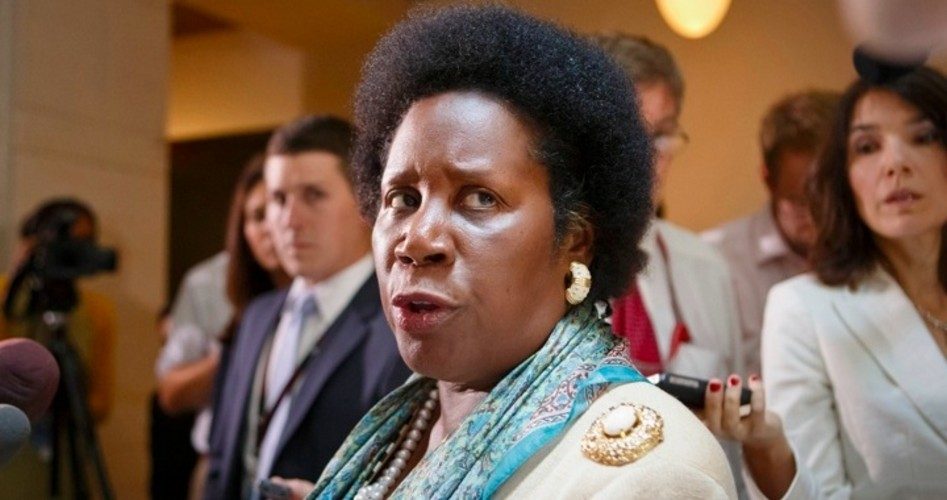
Congresswoman Sheila Jackson Lee (D-Texas) told a meeting of the new Congressional Full Employment Caucus January 29 that the chief job of Congress in the coming months should be to draft executive orders for President Obama to sign instead of Congress passing laws themselves, as required by the U.S. Constitution and its separation of powers doctrine.
Rep. Lee stated:
We have a dream that is attainable, Mr. Conyers…. People need work, and we’re not doing right by them to creating work. I believe this caucus will put us on the right path. And we will give President Obama a number of executive orders that he can sign with pride and strength. In fact, I think that should be our number one agenda. Let’s write up these executive orders — draft them, of course — and ask the President to stand with us on full employment.
Congresswoman Lee’s “number one agenda” should instead be following her oath to “support and defend” the U.S. Constitution, which does not allow the president to legislate by executive order. Article I, Section 1, Clause 1 of the U.S. Constitution reads: “All legislative Powers herein granted shall be vested in a Congress of the United States, which shall consist of a Senate and House of Representatives.” If “all” legislative power rests in Congress, then it stands to reason that none remains for the President. The president has no authority for “creating work” outside of any law passed by Congress. Shockingly, Lee’s suggestion that the role of the legislature should be that of an advisor toward presidential legislating-by-executive-decree mirrors exactly the legislative plan outlined by Adolf Hitler in his autobiography, Mein Kampf. In that book, Hitler wrote that the executive branch would be in control of the legislative and executive functions of government while the legislative branch should be relegated to a mere advisory role in which the executive would make the laws:
[O]ne will not be able to do without those corporations which today we call parliaments. Their councilors will then actually give counsel, but responsibility can and must be borne always only by one man and thus he alone can and must have the authority and right of command.
Hitler’s view was that there should be an executive with total power and control, without interference from an elected legislature. The Nazi Party, Hitler wrote, “rejects a principle of a decision by the majority, by which the leader is degraded to the position of the executive of the will and the opinion of the others. The movement, in small things as well as big things, represents the principle of a Germanic democracy: choice of the leader, but absolute authority of the latter.”
Father of the Constitution James Madison explained in The Federalist, No. 47, that the American Republic was founded upon the opposite principle of separation of powers: “The accumulation of all powers, legislative, executive, and judiciary, in the same hands, whether of one, a few, or many, and whether hereditary, self-appointed, or elective, may justly be pronounced the very definition of tyranny.” In that Federalist paper, Madison quotes enlightenment-era theorist Charles Montesquieu, who wrote in his book The Spirit of the Laws: “When the legislative and executive powers are united in the same person, or in the same body of magistrates, there can be no liberty.”
The Madison/Montesquieu model flatly contradicts Hitler’s model in Mein Kampf, which stated that “He who wants to be the leader bears, with the highest, unrestricted authority, also the ultimate and the most serious responsibility.” Obviously, these two paths of governance lead to widely divergent results with respect to human rights and liberty.
Presidential candidate Obama pledged in 2008 not to use executive orders and “signing statements” as a means of doing an “end run around Congress.” Then-Senator Obama condemned the idea that a president “can make laws as he goes along. I disagree with that. I taught the Constitution for 10 years. I believe in the Constitution and I will obey the Constitution of the United States. We’re not going to use signing statements as a way of doing an end-run around Congress.”
But President Obama has taken a different path. He has increasingly adopted Hitler’s model of governance while rejecting the Madisonian model he once championed on the campaign trail as senator. In his January 28 State of the Union address this year, Obama repeatedly claimed the authority to legislate through executive order when Congress refuses to do so. On Congress’ refusal to raise the national minimum wage, Obama announced:
And as a chief executive, I intend to lead by example. Profitable corporations like Costco see higher wages as the smart way to boost productivity and reduce turnover. We should too. In the coming weeks, I will issue an Executive Order requiring federal contractors to pay their federally-funded employees a fair wage of at least $10.10 an hour – because if you cook our troops’ meals or wash their dishes, you shouldn’t have to live in poverty.
In the same address, Obama also pledged to “slash bureaucracy” and to create by executive fiat a retirement vehicle he called “MyRA.”
Obama failed to cite any congressionally authorized statute for legal authority to issue any of the above mandates. Of course, Congress should be furious that the president is usurping their exclusive legislative role — and some members of Congress are furious. But Obama’s policy of legislation-by-executive-order has now found a champion in the person of Congresswoman Sheila Jackson Lee.
Photo of Congresswoman Sheila Jackson Lee: AP Images



